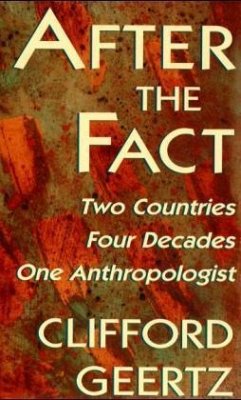The nervousness about speaking for others grows out of the introspections induced in anthropologists by the massive decolonization after the Second World War. That most of the classic field studies were carried out in colonial or semi-colonial settings, settings in which being white and Western conferred in itself a certain privilege and involved, willy-nilly, a certain complicity, has raised questions of the right of the politically dominant to articulate the beliefs and desires of those they dominate. The history of ethnography, or so anyway it has come to be argued, is one of the appropriation of the voices of the weak by those of the strong, much as their labor or their natural resources were appropriated by more straightforward imperialists; and this, so also it is argued, ill-fits it to play its self-assigned (and self-congratulatory) role of the tribune of such voices in the contemporary world. Compromised in its origins, it is compromised in its acts-ventriloquizing others, making off with their words.
The second concern, that about the inability of anthropologists, most of them American, British, German, or French, and virtually all of them Western trained, to free themselves from views derived from their own culture so as to see other peoples “in their own terms,” is but the worry about occluding other voices expressed in an epistemological key. If the frames of meaning upon which we depend to find our own way about in life are so deeply ingrained in us as to color our every perception, it is difficult to see how our accounts of what others feel or think or do, to say nothing of our theories about them, can be anything but sheer imposition. Imposition and systematic distortion: “orientalism,’° “cultural hegemony,” “symbolic domination”-the ethnographic claim to knowledge is everywhere put into a moral shadow, redescribed as an impress of power.
All this doubt and meta-doubt is completed and made seemingly inescapable by the viewing of social science discourse, anthropological or any other, as politically charged, shot through with implicit claims to mastery and control. The capacity of language to construct, if not reality “as such” (whatever that is), at least reality as everyone engages it in actual practice-named, pictured, catalogued, and measured makes of the question of who describes whom, and in what terms, a far from indifferent business. If there is no access to the world unmediated by language (or anyway by sign systems) it rather matters what sort of language that is. Depiction is power. The representation of others is not easily separable from the manipulation of them.
If one is not simply to surrender to these anxieties and declare anthropology impossible or, worse, oppressive (and some, indeed, have done just that), it is insufficient just to press on regardless. The view, favored among “back to real anthropology” traditionalists, that the absorption with such matters is but the product of fashion and will soon dissolve, is quite wrong-itself a fashion, worn and outmoded. It is simply the condition of things that anthropology, like social science in general, is a far more difficult line of work, difficult and uncomfortable, now that the “we define, they are defined” assumptions that sustained and guided it in its forming phases have been brought into question. There is a need for extensive revisions of our notions as to what anthropology is, what its aims should be, what it can reasonably hope to accomplish; why it is anyone should pursue it. If the relation of what we write to what we write about, Morocco, say, or Indonesia, can no longer be credibly compared with that of a map to a distant territory hitherto uncharted or to that of a sketch to an exotic animal recently come upon, what can it be compared with? Telling a believable story? Building a workable model? Translating an alien language? Construing an enigmatical text? Conducting an intelligible dialogue? Excavating a buried site? Advancing a moral cause? Restructuring a political debate? Staging an instructive illusion? All these possibilities and more have been suggested and counter-suggested; but the only thing that seems certain is that the game has changed.
Once again, however, these transformations in outlook and attitude, in anthropologists’ sense of what they are up to and what they should expect to gain from it, are not mere conceptual changes, driven on by the pure dialectic of theoretical debate, which doesn’t play that great a role in anthropology in any case. They are changes in the way in which anthropology is practiced, driven on by alterations in the concrete circumstances under which research is conducted. It is not just ideas that are no longer what they were. The world isn’t either.

Leave a comment